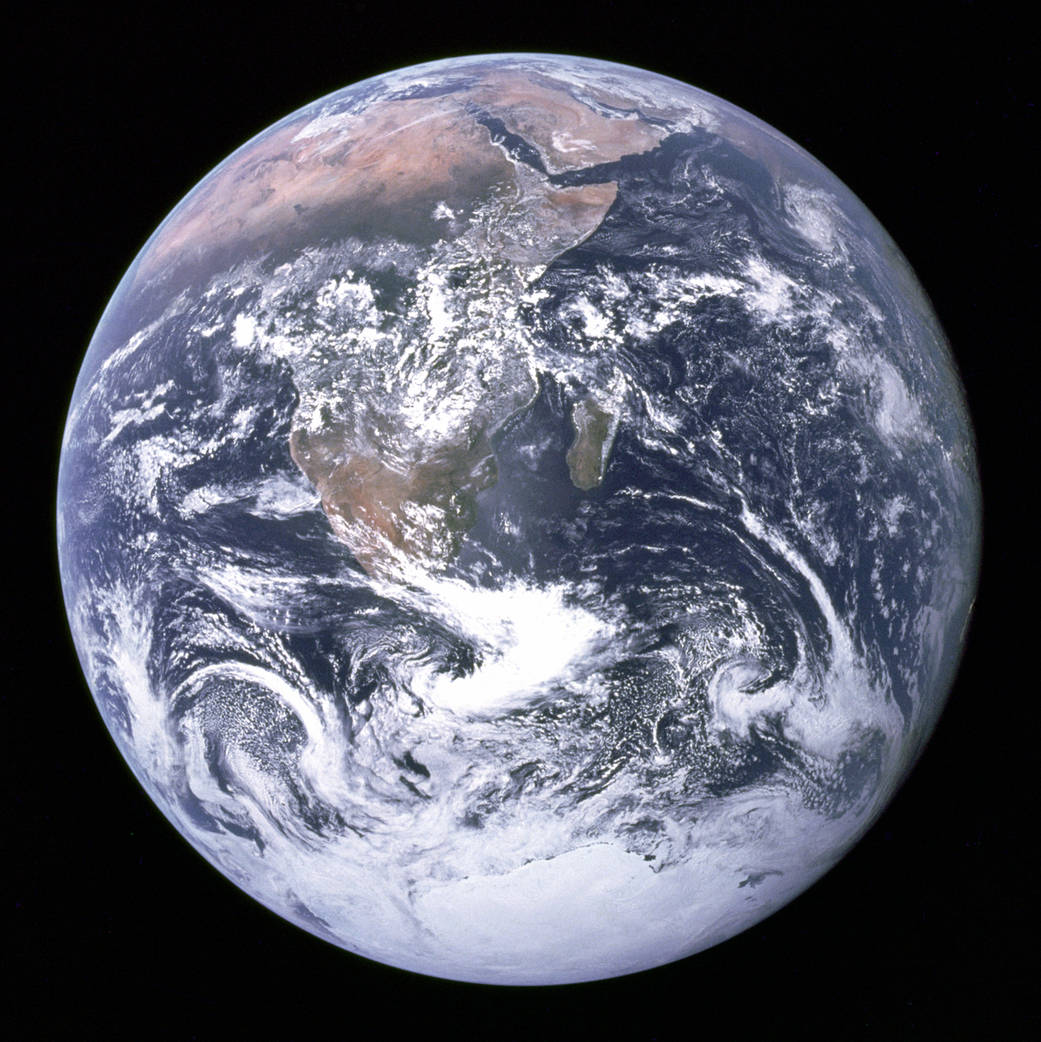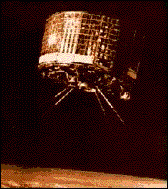Should NASA Be Observing the Earth?
Should the President-Elect Be Getting Better Science Advice?
Barry Klinger, 25 November 2016

Arguably this picture of the Earth is the most important image
NASA ever created. It illustrates the truth that Earth is not the
limitless terrain that tiny humans imagine when they are treading on
it, but a brilliant and isolated oasis in a vast universe. It was
snapped by the Apollo 17 crew on their way to the moon, a fact that reminds us how hard it is to separate the exploration of "out there" from the exploration of "back here". It came to
mind when I saw the story that the incoming presidential
administration was considering removing
earth science research from NASA.
The article quoted Bob Walker, former Congressman (R - PA) and senior Trump campaign adviser on NASA. "'We see Nasa in an exploration role, in deep space research,' Walker told the Guardian. 'Earth-centric science is better placed at other agencies where it is their prime mission.'"

Mr. Walker's contention that "deep space research" is more central to NASA's mission than Earth science rewrites the history of the agency. The founding document of NASA does not mention either term, but does include the rather general objective of "long-range studies of the potential benefits to be gained from, the opportunities for, and the problems involved in the utilization of aeronautical and space activities for peaceful and scientific purposes." NASA efforts to study Earth from above date to at least 1960, when the first Television Infrared Observation Satellite (TIROS) was launched (TIROS 2 is shown here). A plethora of increasingly sophisticated satellites followed. Research at NASA's Goddard Institute for Space Studies on the atmosphere of Venus with its runaway greenhouse effect led to effort there to study climate change on Earth.
"Heavily Politicized"
Mr. Walker told The Guardian that "climate research is necessary but it has been heavily politicized." A later interview on the Canadian radio's
As It Happens shows that it is Mr. Walker whose pronouncements on science are dictated by politics. Regarding global warming, he told interviewer Carol Off "I think there are a significant number of climatologists who are skeptical of the man-made part" and followed up with an email "citing reputable sources" for his claim: "the National Association of Scholars has reported the [sic] 40% of scientists with a specialty related to climate do not ascribe to anthropogenic warming."
This certainly goes against the well-established consensus
that humans are making risky alterations to the climate, so I thought
I would track down Mr. Walker's unusual statistic. I had never heard
of the National Association of Scholars (NAS) before, but after a quick
internet search I learned that among the key issues NAS
seeks to address are
"profligate spending by colleges and universities", "exclusion of
conservative and traditional viewpoints", "broad imposition of the
'sustainability' agenda on university activity" and "systematic
denigration of American society". An odd source to look for information that is not politically motivated, but does it have objective evidence supporting Mr. Walker's statement? Upon some further searching, all the justification I could find for Mr. Walker's 40% figure consists of this sentence from NAS::
"S. Fred Singer said in an interview with the National Association of Scholars (NAS) that 'the number of skeptical qualified scientists has been growing steadily; I would guess it is about 40% now.'"
(Singer is a physicist noted for his skepticism on the effect of passive smoke on cancer, CFC's on the atmospheric ozone hole, and CO2 on climate.)
Carol Off said to Walker, "Here's a statement: 'Human activities are responsible for almost all of the increase in greenhouse gases in the atmosphere over the last 150 years.' Would you agree with that?" Walker's response was "I don't know whether that's true or not." Interesting statement from someone who is giving advice about how climate research should be managed. There are many uncertainties regarding climate change, but the human contribution to atmospheric CO2 is not one of them. In fact, this is such a basic and well-established fact that doubting it constitutes a "tell", generally indicating either great ignorance of the subject or overwhelming ideological resistance.
Where and Why
The distribution of research and environmental monitoring among different agencies and institutions is a complicated question which deserves much more discussion than what I can supply here. However, I think a few points are clear.
- When people use politicized information while decrying politicized science, one is justified in questioning their intentions.
- It is said that a president can be successful if he knows how to choose the best qualified people to help run the government. I would hope that someone giving advice on climate science research would actually know something about climate science.
- Government agencies must often be able to "walk and chew bubble gum at the same time"; we don't have a separate NASA for manned spaceflight and for unmanned flight just because different people may have different priorities for these efforts. Maybe we should have a separate agency for inner planets and outer planets? It does not hurt, and in some ways it may help, NASA's work exploring other planets and beyond to also explore our planet.
- Given the context of uninformed attacks on the science mainstream being made by the person floating this idea, it is perfectly reasonable to suspect that the purpose is not to make the management of research more efficient, but is to impede research which may uncover environmental news that the incoming administration does not want to hear.

NASA Earth Science Division Operating Missions
Last modified: 25 November 2016


